Shanxi agriculture thrives, boosts farm income


Agronomists teach a farmer (right) in Fangshan county new farming skills.

An artist creates a piece of calligraphic work to express his joy over the positive changes in the rural areas of Fangshan county. Photos by Wu Liuhong / For China Daily
Shanxi province in North China has made great strides in its agriculture and rural development over the past 10 years as seen in the substantial increases in grain output and revenue earned by its farmers.
Local statistics show that the province's grain output increased from 13.09 million metric tons in 2012 to 14.24 million tons in 2021. The combined output value in the industries of farming, animal husbandry, forestry and fishery grew from 130.4 billion yuan ($18.44 billion) to 213.4 billion yuan during the same period.
The per capita income of rural residents more than doubled from 7,064 yuan to 15,308 yuan during the past decade, with an increase surpassing many provinces and autonomous regions in China.
Officials said such achievements are the results of targeted efforts by the government in poverty relief and rural vitalization, like fostering industries with local characteristics, and promoting agricultural modernization, as well as assistance from various stakeholders of the society.
Wu Lianxiang, a resident in the village of Wujiapu in Taigu district of Jinzhong city, was busy planting the Chinese mugwort herb together with her fellow farmers on Oct 22.
Chinese mugwort is a popular ingredient for making healthy food and traditional Chinese medicines.
Wu said the Chinese mugwort was introduced from Henan province by the operators of the Jinzhong National Agricultural High-Tech Zone, to which her home village is nearby.
The high-tech zone began to cooperate with the Gardening School of Shanxi Agricultural University in 2020 to establish a cultivation base for medical herbs and vegetables with high quality and promising market potential, aiming to promote the new varieties to the entire province.
"This is the slack season for my own farm, so I'm doing a part-time job with this Chinese mugwort cultivation base," Wu said. "I'm paid more than 100 yuan a day."
She added that working with the agricultural high-tech zone is now a major source of family revenue.
"There are abundant job opportunities throughout the year," Wu said. "You can make money all year round if you are willing to work."
While Wu is still working part time in the farming work of the zone, she said a lot of fellow villagers are employed by the local agricultural products processing companies as full-time workers.
Officials said the booming agricultural products processing industry is creating more job and revenue opportunities for rural residents.
Statistics from the Shanxi Department of Agriculture and Rural Affairs show the industry has kept an average annual increase rate of 12.3 percent over the past decade to reach a total sales revenue of 262 billion yuan in 2021. During the first eight months of 2022, the value reached 218.3 billion yuan and the whole-year figure is expected to hit 320 billion yuan.
Another sector significantly contributing to rising income of residents is the rural tourism industry.
The department's data indicated that the rural areas in Shanxi received more than 67 million tourist visits in 2021, generating total business revenue of 8.13 billion yuan for 424,000 rural residents involved.
Local enterprises in Shanxi are also contributing their efforts to promoting rural vitalization and helping farmers increase their earnings.
Shanxi's famed liquor company, Xinghuacun Fenjiu, for instance, is helping rural residents grow their revenue by establishing sorghum farming bases in Fangshan county.
Chang Jianwei, deputy general manager of the company, said sorghum is the main ingredient for producing white liquor. It began to develop sorghum farms in Fangshan at the beginning of this year.
"This project is a win-win deal for both local farmers and Xinghuacun Fenjiu," Chang said. "The farms in Fangshan are designed to supply high-quality sorghum to our company and local farmers are offered better opportunities for growing revenue and obtaining new farming skills."
Chang said Xinghuacun Fenjiu's operations in Fangshan are now at a small scale with only four farms totaling nearly 7 hectares.
"We are at a stage of trial operation and we will plan for expansion judging from the quality and quantity of sorghum yields," he said.
Chang said the first batch of sorghum was harvested recently, with a per-hectare output of nearly 10 tons, which is described by him as beyond their expectations. "And the quality is as good as we expected," he added.
Based on this year's experiment, he said the company is planning to expand its operations in Fangshan for years to come.
"We will supply qualified seeds and fertilizers to farmers for free," Chang said. "This move aims at controlling product quality while helping farmers slash their operational costs."
The company is also launching training courses for farmers, helping them master skills for modern farming, the executive said.
By YUAN SHENGGAO
Wang Xiujuan contributed to this story.











